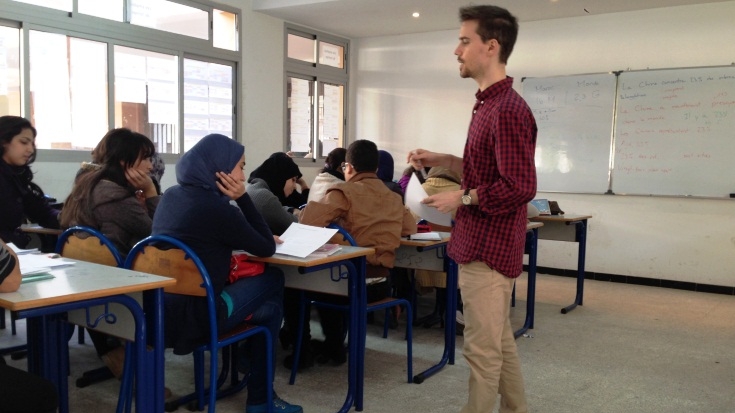
Classroom Community to Restore Faith in Public Schools
Casablanca, Morocco
Since its independence in 1956, the Moroccan educational system has been pulling out all the stops to make a reform that would be truly satisfying. The post-colonial era was highly precarious because it gave rise to the unprecedented demand of improving an educational policy that would meet the needs of a new social and economic reality. The educational system has experienced reform attempts since The Royal Commission for Education Reform established the first reform in 1957 under the name “Educational Movement.” The efforts to improve the Moroccan educational system cannot be denied especially in highly competitive world. Education cannot be reformed without sincerely bringing back and strengthening a sense of trust along with a sense of community in Morocco’s public schools.
The educational system is constantly receiving criticisms that are preoccupied with reproach per se. They shed light on causes and effects, but they do not think further and provide or suggest solutions. They seldom give credit to successful public schools. Instead, they are much more interested in reproaching and pointing fingers at schools that are failing. Such misled attention has for years done little to ameliorate the conditions of teachers and students in public schools. Unfavorably, this attention has discouraged teachers and made people believe that public schools lack efficiency. Most people are, in fact, satisfied with the performance of public schools. That is the result of the hard work of teachers who are preoccupied with giving students a proper and fruitful educational experience. The previously mentioned criticisms are based on schools’ results and statistics, which is not wrong. But, depending solely on statistics or numbers is a short-sighted approach to judge schools, and this approach will, of course, lead to short-sighted measures to solve the issue.
Despite the hard work of many teachers and administrators to improve public schools and make students’ daily tasks more educational, there seem to be some misconceptions that hamper progress. A lot of effort is being made to improve the educational system, but the malfunction resides in the way education is perceived and approached. Schools and school life should not be synonymous with teaching for tests, coverage of content, and memorization. Instead, application, critical thinking, and generating creative thoughts are what public schools need. Going down that road results in overloading the school day and the school year with drill-and-kill exercises that are designed to prepare students for tests; and nothing beyond that. This kind of education is not what students need to face and succeed in their battle in the after-school life. It’s like preparing students to succeed in a part of their life, that is school, and forget about their future. Education should not adopt the assembly line approach with dealing with students as if they are parts of a machine that teachers are making. Indeed, school is a stage in everybody’s life; it’s also one of the first places to learn about community, but it’s a stage that is crucial enough to shape the future of everybody. Therefore, in this critical stage students need to receive an education that is connected with the world at large and has a genuine purpose so that students would know how to make a difference.
Most of the anomalies that teachers and students experience in schools are the manifestation of a general lack of community. Teachers, administrators, and anyone who has a say in education should rethink about the way schools are organized. The concepts of discipline, classroom organization, and school climate should be redefined. Thinking of public schools and classrooms as communities is the key element and the basis of the reforms that the educational system necessitates. Students should first learn about being members of a community. They should also learn about believing in the common good and accepting and working with others who are different and who are from different backgrounds. That is the spirit that is needed in our public schools.
In our society when someone says that she/he is a teacher, the first thing society asks about is “how do you deal with student? Aren’t they driving you crazy?”. The questions are not groundless because there is a belief that students are annoying, and they should be kept under control. That’s why some teachers struggle with discipline and classroom management. All their concern is to keep students at their desks, mouth closed, eyes forward, and at times, brains turned off. In this environment students learn obedience, not community. Students come to school with everything that is happening in their life outside school; we all do. Hearing students and giving them the chance to express themselves would certainly have a good impact on students. Why don’t we give students the opportunity to set the rules of conduct in the classroom and make them vote for school rules? By doing so, students will learn how to be responsible for their actions. They will also develop a sense of ownership, belonging, autonomy, commitment, and community.
Most students in public schools feel as if they are observers instead of being participants. They complain about being treated like passive receivers of instructions. Students want to have a say in what happens in the classroom. That’s why considering the classroom as a community is vital. To build community in a classroom is anything but simple in public schools. The concept of community should be implanted in students as early as primary school. They should believe that they are active members in the classroom and that they are not there to be quiet and nod their acceptance. Through classroom community, students can develop a sense of responsibility and a sense of the group. They can also learn, bit by bit, how to deal with their own problems and the benefits of listening to and accepting different points of view.
For as long as I can remember, listening to students and asking them about why they act in a certain way in the classroom have always brought satisfactory results. If teachers and administrators stop playing the role of a police officer at school and try to listen to what students have to say, they will realize that the problem resides in asking the wrong questions. Instead of interrogating students, it is better to ask them what their concerns are, what their goals are, and how they want to see their school. What seems insignificant in our eyes is often of vital importance in theirs. Students have the right to discuss all the aspects of their school life and what they experience every day at school. They do not feel that school is their school. If we give them the chance to change the setting or at least express their opinion about it, we will be able to understand what they want and work together to achieve satisfaction.
Students spend three to four years in high school; students and teacher should not spend years in lecturing, testing, and taking notes. Teachers and students should work as partners in a community. By doing so, teachers and students would know each other well as who they are and what they care about. The environment in the classroom would be one of the teacher as member of the class community, as a collaborator, not as a boss or adversary. Teachers can have a specific time set aside for classroom meetings. If students have any questions or problems, they can discuss it with their teachers and reach an agreement or find a solution. Here is where problems are solved, rules are set, and decisions are made as one group and one community. This would build in students a sense of personal and collective responsibility. This would make better citizens as well.
The role of teachers is not only about delivering lessons, but also about making pure human connections, improving skills, and boosting self-confidence. Considering the classroom as one community in which teachers and students work together definitely has beneficial results. Every student learns that she/he is valuable and that each is a participant in an effective and productive group of young people working together with a common mission. This sense of community would surely restore students’ faith in public schools. It would also help students see themselves as participants in the classroom, the school, and the society as well. Public schools are the perfect groundwork to prepare students to become responsible citizens, to improve social conditions, to make youngsters believe in community and equal opportunities, and to promote cultural unity.



